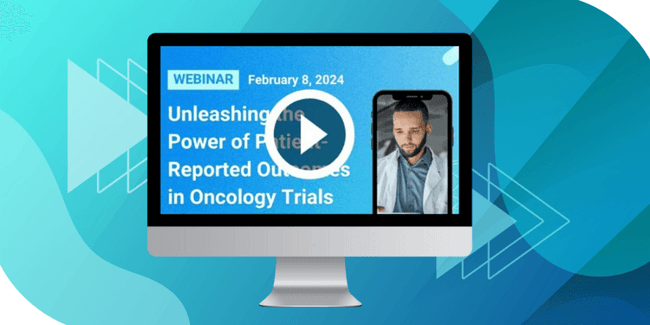Webinar Recap: the Power of PROs Throughout Oncology Drug Development

If you missed Signant’s February 2024 webinar about optimizing patient-reported outcomes measurement strategy throughout oncology drug development, we’ve summarized the key takeaways and provided a link for you to watch the recording.
Webinar Takeaways
In light of recent draft guidance from the FDA on core patient-reported outcomes (PROs) in cancer trials and on dose optimization in oncology drug development – thoughtful collection and interpretation of patient experience data in oncology clinical research is becoming even more critical.
Our leading eCOA science and oncology research experts explored use cases and shared practical tips for optimizing PRO measurement strategy in oncology drug development, from early phase to phase III.
Topic 1: Modular implementation in phase III, and meeting the needs of all stakeholders
Even though we collect data remotely in multiple other therapeutic areas, oncology is not one where we routinely see this employed, so that brings with it the technologies, techniques, and methodologies for remote data collection.
It’s possible to take a modular approach where we use more specific instruments at an increased cadence or frequency. We can still meet the needs of other stakeholders in the process as well, but there may be additional data that needs to be collected for regulators or people who are doing economic impact assessments and things like that.
So, we can continue this modular approach with a more frequent assessment of the core domains and maybe smaller, more specific instruments. And then there’s another larger, full form necessary for the full data set. This could be performed at a less frequent pace throughout the study, and we can meet the needs of everybody involved.
Topic 2: Patient burden considerations for at-home and more frequent PROM completion, and the potential of computerized adaptive testing
As we move from traditional site-based collection to gathering data more frequently in a home setting, we need to consider patient burden. It’s important to explore the impacts of the disease, its treatment, the patient’s ability to do some things, and their willingness to use technology.
Considerations for patients undergoing chemotherapy may include:
- Peripheral neuropathy in the hands, which might make operating a smartphone more difficult
- Fatigue and concentration issues; the “chemo fog” patients describe
- “Dark days” during a cycle of treatment when a patient stays in bed, doesn’t eat, or interact with others
One way of reducing the burden is to consider computerized adaptive tests. Adaptive tests select the next question to ask the patient based on their response to the previous question. It’s trying to get the most accurate measure of that particular domain by asking the most pertinent questions, which can reduce the number of questions asked.
As we think about reducing the burden for patients in oncology trials and with patients who may be feeling particularly unwell, reducing the number of questions to still get an accurate estimate of the domain that we’re interested in may be a really good and important way forward.
Topic 3: The role of PROMs in early-phase oncology trials to inform optimal dose determination
The audience was polled on how often they use PROs in phase I oncology trials. Most said, “some of the time,” followed by “never.” As for utilizing PROs in phase II oncology trials, a majority of the audience said, “some of the time,” followed by “all of the time.”
There are several reasons why people may not want to use patient-reported outcomes in early-phase studies. But it’s going to become more important as we move forward for a few reasons.
Emerging regulatory thinking, such as how doses are selected in oncology trials, can lead to a better understanding of the dose-response relationship. Integrating PROs can redefine tolerability as many symptomatic adverse events affect the quality of life but are unobservable and best known by the patient.
Meet the Experts
Anthony Everhart, MD, FACP, is the internal medicine leader at Signant. Dr. Everhart is board-certified in internal medicine and a fellow of the American College of Physicians with over 23 years of experience in the practice of medicine and over 12 years of experience in clinical development. Prior to joining Signant, Dr. Everhart held positions of Vice President, Medical Affairs and Vice President, Medical Informatics at Chiltern and Covance, and consulted independently in the areas of medical monitoring, medical data review, data analytics, and physician adoption of technology. He has worked in all phases of clinical development in numerous therapeutic areas including allergy & immunology, cardiovascular, hematology & oncology, infectious disease & HIV, neurology, ophthalmology, psychiatry, respiratory, and rheumatology.
Bill Byrom, PhD serves as Vice President of product intelligence and positioning at Signant Health, where he also serves as a principal ePRO scientist. He has worked in the pharmaceutical industry for 30 years and is the author of 80+ publications and two industry textbooks on electronic patient-reported outcomes (ePRO). His recent scientific work includes the use of wearable technology and bring- your-own-device (BYOD) eCOA in clinical trials.
Watch the recording
You can watch the recorded webinar here.


